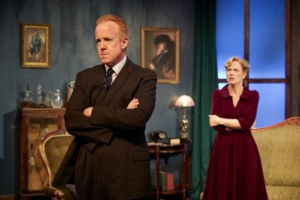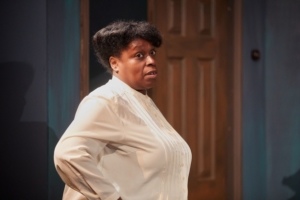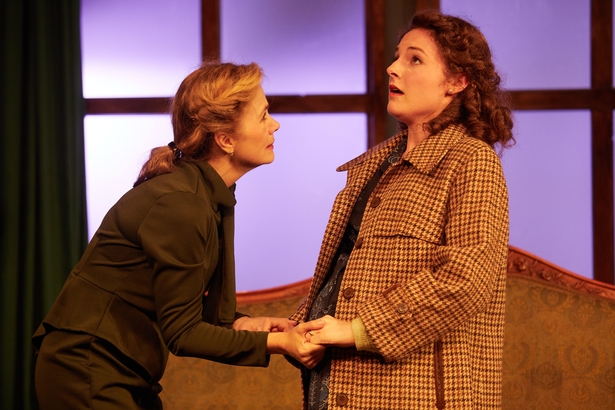MADDIE DUNN reviews Lesley Storm’s play Black Chiffon at the Park Theatre.
Lesley Storm’s three-act play Black Chiffon has rarely been performed in the UK since its West End debut in 1949. This production, directed by Clive Brill and transferring from Frinton Summer Theatre, sees this engaging, intriguing and emotive script back in London at Park Theatre. Despite risking seeming dated, the production, with its dedicated cast and crew, proves that core values and sentimentalities concerning family life and relations, central to this play, are universal and consistent.
The plot follows a respectable, wealthy family in the October of a post-war England. Housewife Abigail, played with precision and truth by Abigail Cruttenden, is the crux of this ‘perfect’ household. This responsibility feels even more pronounced as the wedding of her beloved son Roy (Jack Studden) to the delightful Louise (Jemima Watling) swiftly approaches. However, the façade of their familial purity and supremacy begins to unveil and is then effaced when Abigail reveals she will face trial in court for stealing a black chiffon dress. But Storm’s play is not merely a living-room drama. Dr. Hawkins (Nicholas Murchie) is brought in to build her court defence of mental instability, which could excuse her from the charges, channeling the play into a riveting psychological study of the maternal figure and the inexorable attachment she may have to her son.

Where this company most excels is in their ability to demand constant engagement from their audience and this is especially achieved through the rise and fall of intensity and pace in Brill’s direction, most notably in the final duologue between Abigail and Robert before the court case. Another thoughtful element is the use of the two central windows, integral in the script as characters frequently pre-empt others’ entrances. This also visually elevates this family to their (precarious) ivory tower and, with characters recurrently gazing out them, gestures to the smothering quality of this fragile family environment. With the audience entering through the same entrance as the actors, decorated as the corridor of the house, a ‘fly on the wall’ watching experience is created, emphasising the intensity of this small but ornate room. This intensity is unfortunately briefly lost during scene changes: during one in particular, the blackout is not dark enough to conceal Yvonne Newman, playing the Nannie, collecting various props and felt rather slow. Scene changes like this could be incorporated more into the scenes by utilising this housekeeper character thereby making the production that bit more seamless.

The delineation of characters in this production is superb: specifically, Kelly’s militaristic, sexist father of the house, Eva Feiler’s endearing and amusing Thea, and Nicholas Murchie’s observant and reposeful Dr Hawkins. However, Cruttenden as the lead was stand-out, particularly in exerting character development. We see her begin as a vivacious mother in her prime, adored by her two children and busying around to prepare the house and food for guests. Her smile then becomes increasingly taut and forced, proving the psychological depths of the character and of the play, with its Oedipal connotations. As Cruttenden lies back on the sofa, her eyes fervent and glazed over with tears, the mental vulnerability of this mother who feels that her son’s departure is ‘in a kind of way… the end of my life’ becomes most evident and heart-rending. However, the ultimatum of the play, the ‘one decision’ Abigail is forced to make between preserving her household’s social reputation and preserving her relationship with her son, suggests that the play is not only a nuanced study of one figure but equally a statement on the desire to keep up or reinstate appearances in a society only recently devastated by war. The production’s ability to speak on these two levels is admirable and interesting, and is certainly worthy of a modern audience.
‘Black Chiffon’ runs until the 12th October at Park Theatre: more info here.
Featured image courtesy of Mark Douet.





